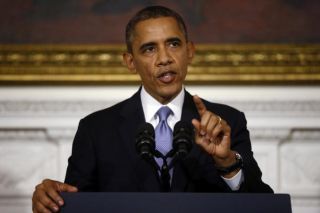Persuasion
The President Needs to Learn Motivational Interviewing
Barack Obama has no concept of personal persuasion
Posted October 21, 2013

The President in hectoring mode -- as usual
The President needs a new style for persuading people. As characterized by Maureen Dowd in the New York Times, following his recent victory over the Tea-Party-led Republican Party in raising the debt ceiling, he "couldn’t resist taking a holier-than-thou tone toward his tail-between-their-legs Tea Party foes. He assumed his favorite role of the shining knight hectoring the benighted: Sir Lecturealot." "Everyone sees that I am right," the President believes. "Now you should too."
As we say in the addiction field, "How's this been working for you so far?" (I say it to people who have been in and out of AA and 12-step treatment for decades.) You see, there's another approach that has been proven effective, time and again, in addiction and related kinds of therapy—motivational interviewing (MI).
MI, as developed by psychologist William Miller and his colleagues, has been the hottest approach in alcoholism and other clinical practice for several decades now. Jon Morgenstern of Columbia University and his colleagues compared the effectiveness of a MI-based behavioral approach with naltrexone for reducing problem drinking in a group of gay men, a population with which previous interventions had been ineffective. The result: MI was more effective than naltrexone on all of the drinking-reduction measures used. Furthermore, "there was no advantage to adding naltrexone to MBSCT (MI based self-control therapy)."
I trained the counselors at my residential rehab for addiction in motivational interviewing (MI). It was the basis for all of our treatment. In a nutshell, here's how MI works. You don't tell people what to do, or how they should think about themselves and their problems. Rather, you ask them questions —questions you don't pretend to know the answers to—so that they may consider their choices in terms of their own thinking and values. Because, you see, people don't change their behavior and attitudes because you tell them to. Instead, they react to being told what to do by erecting defensive barriers and hunkering down.
And this simple truth, despite all of the President's education and political experiences to the contrary, has escaped the President and his handlers. Or, in MI terms, they haven't allowed themselves to think through the consequences of their approach. One more thing, of course, is they need to be trained in the motivational interviewing approach. Now that my book, Recover!: Stop Thinking Like an Addict, is complete, I can come down to DC for a day or two to ask the President some questions.
Here, the first ten questions are free:
1. Are you satisfied with your recent experiences in governing America?
2. What are the major problems you have encountered?
3. What do you think causes these problems?
4. Is there anything you can do to address these sources of conflict?
5. Follow up: Are you saying you have no way to address these issues? You're powerless over them?
6. What people cause you the most problems in performing your job?
7. How would you describe your personal relationships with each of these people?
8. Are there any realistic steps you might take to improve those relationships?
9. Excuse me, Mr. President. The question wasn't "How do these people make it impossible to deal with them?" It was "How can you deal better with these people going forward?"
10. Do you feel there is anything in your approach—even your personal style—that makes it hard for you to answer these questions constructively? Perhaps Michelle might have some suggestions here?
Follow Stanton on Twitter


